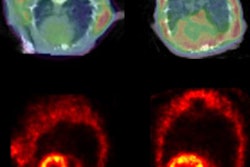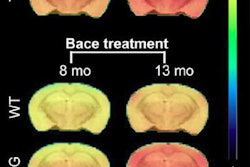At this week's Alzheimer's Association International Conference in Washington, DC, Eli Lilly is touting a new study that shows how PET amyloid imaging with its florbetapir radiopharmaceutical (Amyvid) can change the diagnosis and management of patients with Alzheimer's disease.
Knowledge of amyloid status as determined by florbetapir-PET changed the management of a majority of the study patients, particularly regarding their use of cholinesterase inhibitors, according to the company.
In the study, 618 subjects were randomized into one two groups after being scanned: 308 individuals received immediate feedback on their amyloid status, while 310 were told of their status after a year. A total of 602 subjects completed a three-month follow-up visit and 560 completed the one-year follow up.
Treatment management changes occurred in 68% of subjects in the immediate-feedback group, compared with 56% in the delayed-feedback group. The researchers attributed the difference primarily to Alzheimer's disease medication changes, particularly cholinesterase inhibitor use.
Meanwhile, the knowledge of amyloid status changed patient diagnosis in 33% of the immediate-feedback group, compared with 6.4% of the delayed-feedback group, according to Lilly.




















